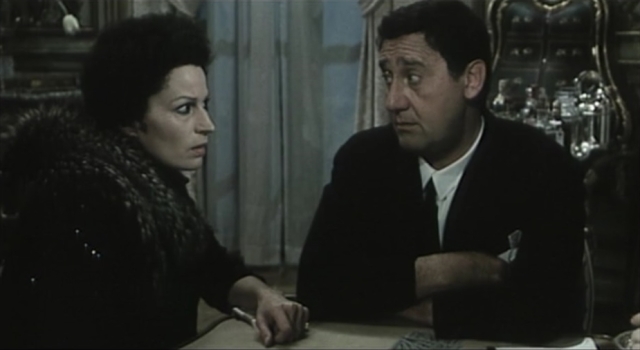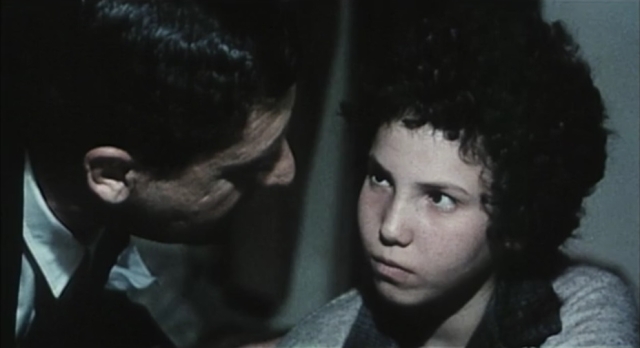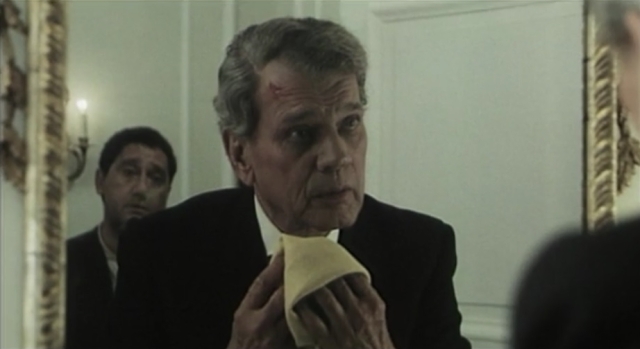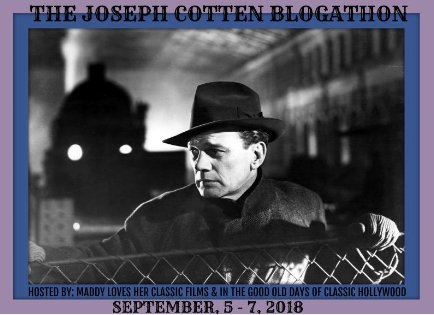
“We live in a squatter’s shack that’s overrun with rats. Every time it rains, the firemen must take us away by boat. Your dad was injured during the war. He can’t work any more than he does; otherwise, he’d be a hard worker … You must understand that our only hope is winning some money from that old lady.”

Every May, an elderly, fabulously rich woman (Bette Davis) — it’s rumored that her daily income is twenty million lire — descends on Rome in order to spend the month in a luxurious villa at the top of a hill. The locals on whom she literally looks down are far less fortunate, but she insists that the wealth disparity isn’t a problem. “It overlooks a Roman working-class suburb, inhabited by extremely poor people with whom I get along very well,” she tells a reporter at the beginning of Luigi Comencini’s 1972 film Lo Scopone Scientifico. To be sure, the residents of the slum are ecstatic when they learn that she’s returned, all the more so because they thought she was dead; however, their joy isn’t rooted in love and affection for her. “Win millions and millions off the old bag!” and “Give the old lady hell!” they cry to their neighbor Peppino (Alberto Sordi), suddenly a celebrity among them.
For the past eight years, ever since she started making these annual visits to Rome, the rich woman has been inviting Peppino and Antonia (Silvana Mangano), a married couple from the neighborhood, up to the villa on a regular basis. They’re about as poor as everyone around them — he’s a junk man, she cleans a car dealership, and they have five young children, to boot — but they do have one asset that sets them apart from the crowd: they play cards. The rich woman is a fanatic about card games, so much so that during her first stay at the villa, she asked her cook, Pasqualina (Franca Scagnetti), if she knew of any worthy opponents for her in the area. Pasqualina introduced her to Peppino and Antonia, her own next-door neighbors. (“Two poor souls who live next to my shack,” as she describes them.) Since then, they’ve spent many an evening competing against the rich woman and her chauffeur, George (Joseph Cotten), in a game called scopone scientifico — competing and, invariably, losing.

Eight years of crushing defeats might break anyone’s spirit, yet Peppino and Antonia, who have been practicing since last May, are certain that their time will come, has come. So, too, is everybody else in the slum. The idea that two of their own have a chance at a fortune — and a fortune snatched away from a disgustingly wealthy outsider, at that — thrills and obsesses them. They receive play-by-play updates on the game over the telephone, argue for days about the moves that Peppino and Antonia should or shouldn’t have made. Some are more invested in the outcome than others: one man known as “The Professor” (Mario Carotenuto) views it as a political struggle; another is in a neck brace and constant pain two years after being run over by the rich woman’s car, and he wants revenge. “If Peppino doesn’t do me justice, one day I’ll take some gasoline and set her villa on fire,” he proclaims. Still others stand to profit in a more material sense if Peppino and Antonia can finally win: an elderly man is eager to take over their shack once they move somewhere better, for example, and Peppino’s prostitute sister Yolanda (Luciana Lehar) longs to pay off her pimp (Piero Morgia) and start a new life.
Naturally, the couple’s children would reap the rewards as well. “We’ve been unlucky so far. Sooner or later we’ll get lucky and win seven or eight hundred million from the old lady. We’ll buy a big apartment with a terrace, and you’ll all go to university,” Peppino tells them, additionally promising eldest child Cleopatra (Antonella Di Maggio) that he’ll take her to Switzerland so that a doctor can examine her bad leg. Her attempt to appear enthusiastic is halfhearted at best. Although she only seems to be about twelve, she’s already hard and practical, even pessimistic. While Peppino and Antonia are playing scopone scientifico at the villa, Cleopatra urges her little brothers to work on flower arrangements for their uncle’s funeral parlor “so at least tomorrow we’ll have two thousand lire for sure.” She knows better than to pin her hopes on a game, especially one in which the odds are very much against her parents.

In theory, Peppino and Antonia have nothing to lose, because the rich woman lends them a million lire at the commencement of each evening — a gift that inevitably ends up back in her safe once they’ve gambled it all away; in practice, however, it’s another matter entirely. There’s the emotional toll, for starters. They may claim that they only play for fun, but the devastation on their faces as they surrender the money to their opponents tells a different story, and so do the bitter, angry words they exchange after leaving the villa empty-handed. At one point, after being wiped out, they’re so desperate to keep playing that they offer to use their own money; this backfires, of course. Then, when luck does smile on them at last, new difficulties arise. They’re reluctant to walk away from the game knowing that they could double their substantial winnings with another hand — though, as card sharp Righetto (Domenico Modugno) points out, “playing for double is a trap” when facing someone like the rich woman. “She has two thousand billion and she can afford to play as long as she wants, whereas if Peppino makes a false move, he is screwed.” The balance of power remains on her side.
Moreover, she’ll do whatever it takes to prevent Antonia and Peppino from walking away as winners, even if that means putting her own life in peril. “When she loses, she turns into the most wicked woman on earth. Since she was a child, she was used to winning. Being defeated makes her furious,” George explains to the couple in private after she throws a glass at him for playing poorly. “Just the thought that she might lose one thousand lire drives her crazy.” He should know: once a promising artist, he gave up painting some four decades earlier to be with her, working without pay. “For her, I gave up my art and spent my life loving her. And here I am now. I’ve become her chauffeur and her slave. It’s true, I hate her. But I can’t live without her.” Her butler can; in fact, he lends Peppino and Antonia some money and suggests that if they win, they might hire him as their servant. The rich woman is rude to him, nasty to her stockbroker over the phone, and prone to dropping racist remarks about the people she’s played cards with around the world (though Peppino is also guilty in the last case, whether through ignorance or from a desire to please her). Despite her veneer of politeness, her shows of warmth and affection and generosity toward the couple, she’s utterly ruthless just below the surface. (She is, after all, played by Bette Davis.)

Antonia insists that she and her husband have grown fond of the rich woman over the years, and that might be true. Their neighbors certainly don’t feel the same way. To these other residents of the slum, who aren’t acquainted with her in the way that Peppino and Antonia are, she’s more of a symbol than a flesh and blood human being, always “the old lady” or “the old bag.” (Her name is never revealed, enhancing the sense that she’s a kind of impersonal force.) They dream of seizing her riches, either through the game or through outright burglary, and members of the local funeral industry even hope she’ll die in Rome so that they can profit from her death. To be fair, they have good reason to dislike her: she would destroy them all without a second thought for the sake of her own petty victory.
“Money works miracles,” someone cries out during Peppino and Antonia’s run of good luck, but priest Don Roberto (Daniele Dublino) adds a caveat: “Money is also the ruin of the world.” They may both be right.
This post is part of The Joseph Cotten Blogathon, hosted by Maddy Loves Her Classic Films and In the Good Old Days of Classic Hollywood. Click the banner above to see all of the other great posts.


Pingback: The Joseph Cotten Blogathon: Day 1 – Maddy Loves Her Classic Films
Great review, Erin. Thanks so much for the introduction to this little known film. Thanks for joining us to celebrate Joseph and his films.
LikeLiked by 1 person
Thank you, and thanks for hosting!
LikeLiked by 1 person
Fascinating. I had not heard of this film until now and the concept is most intriguing. You really drew me into this strange world with your article.
LikeLiked by 2 people
Thanks! I hadn’t heard of it either until it appeared on FilmStruck when they were featuring Bette Davis movies. Unfortunately, it expired on there the other week and seems to be hard to find elsewhere, but maybe it will turn up again at some point, either on FilmStruck or on TCM.
LikeLike
Pingback: THE JOSEPH COTTEN BLOGATHON IS HERE – In The Good Old Days Of Classic Hollywood.
Thank you for a detailed review. This is one of his works that I never see either. What a treat to look forward too😊
LikeLiked by 1 person
You’re welcome! It’s definitely worth checking out if you can find it.
LikeLiked by 1 person
This sounds like such an unusual film! I’ll keep my eye out for it, for sure.
LikeLiked by 1 person
Yes, it is unusual, not least of all because it’s so odd seeing classic Hollywood stars like Davis and Cotten in an Italian movie from the ’70s!
LikeLike
This films sounds great, its a bit like the program the Million Pound Drop where people start with a million and gamble it away on an answer of a question with three possible answers. I love Bette Davies too.
LikeLiked by 1 person
That sounds interesting — I’ll have to look into that. And yes, Bette Davis is worth watching in anything.
LikeLiked by 1 person